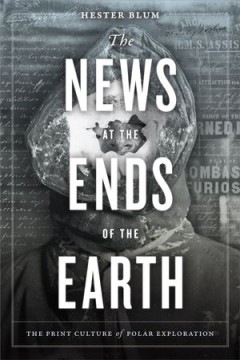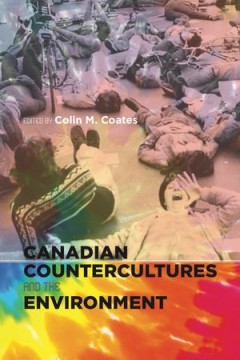Filter by

The News at the Ends of the Earth
From Sir John Franklin's doomed 1845 search for the Northwest Passage to early twentieth-century sprints to the South Pole, polar expeditions produced an extravagant archive of documents that are as varied as they are engaging. As the polar ice sheets melt, fragments of this archive are newly emergent. In The News at the Ends of the Earth Hester Blum examines the rich, offbeat collection of pri…
- Edition
- -
- ISBN/ISSN
- 9781478003229
- Collation
- -
- Series Title
- -
- Call Number
- -

Vulnerability and Adaptation to Drought The Canadian Prairies and South America
Although there is considerable historical literature describing the social and economic impact of drought on the prairies in the 1930s, little has been written about the challenges presented by drought in more contemporary times. The drought of 2001-02 was, for example, the most recent large-area, intense, and prolonged drought in Canada and one of Canada’s most costly natural disasters in a …
- Edition
- -
- ISBN/ISSN
- 9781552388204
- Collation
- -
- Series Title
- -
- Call Number
- -

Reading the Entrails An Alberta Ecohistory
Before the fall of Imperial Rome, priests cast the guts of sacrificial animals on the temple floor, claiming to be able to divine the future from these entrails. By probing the remains of Alberta’s past sacrifices (reading the entrails), the author believes we might dimly see an apparition of Alberta’s future. This controversial book vividly portrays the history of land and life in Alberta …
- Edition
- -
- ISBN/ISSN
- 9781552386712
- Collation
- -
- Series Title
- -
- Call Number
- -

Ice Blink Navigating Northern Environmental History
Northern Canada’s distinctive landscapes, its complex social relations and the contested place of the North in contemporary political, military, scientific and economic affairs have fueled recent scholarly discussion. At the same time, both the media and the wider public have shown increasing interest in the region. This timely volume extends our understanding of the environmental history of …
- Edition
- -
- ISBN/ISSN
- 9781552388556
- Collation
- -
- Series Title
- -
- Call Number
- -

Canadian Countercultures and the Environment
Studies of the radical environmental politics of the 1960s have tended to downplay the extent to which much of that countercultural intellectual and social ferment continued into the 1970s and 1980s. Canadian Countercultures and the Environment adds to our knowledge of this understudied period. This collection contributes a sustained analysis of the beginning of major environmental debates in t…
- Edition
- -
- ISBN/ISSN
- 9781552388150
- Collation
- -
- Series Title
- -
- Call Number
- -

Calgary
How have our interactions with animals shaped Calgary? What can we do to ensure that humans and animals in the city continue to co-exist, and even flourish together? This wide-ranging book explores the ways that animals inhabit our city, our lives and our imaginations. Essays from animal historians, wildlife specialists, artists and writers address key issues such as human-wildlife interactions…
- Edition
- -
- ISBN/ISSN
- 9781552389683
- Collation
- -
- Series Title
- -
- Call Number
- -

Baffin Island
A geographer with extensive research experience in the Canadian North, Jack D. Ives has written a lively and informative account of several expeditions to Baffin Island during the “golden age” of federal research. In the 1960s, scientists from the Geographical Branch of Canada’s Department of Energy, Mines, and Resources travelled to Baffin to study glacial geomorphology and glaciology. T…
- Edition
- -
- ISBN/ISSN
- 9781552388303
- Collation
- -
- Series Title
- -
- Call Number
- -

Gender and Christianity in Modern Europe Beyond the Feminization Thesis
Since the 1970s the feminization thesis has become a powerful trope in the rewriting of the social history of Christendom. However, this ‘thesis' has triggered some vehement debates, given that men have continued to dominate the churches, which have reacted to the association of religion and femininity by explicitly focusing their appeal to men. The authors critically reflect upon the use…
- Edition
- -
- ISBN/ISSN
- 9789058679123
- Collation
- -
- Series Title
- -
- Call Number
- -

The Land, the Bible, and History Toward the Land That I Will Show You
This unique book offers a Catholic view of the Holy Land in the debate that rages among Jews, Christians, and Muslims. Alain Marchadour and David Neuhaus, two biblical scholars and priests living in Jerusalem, clearly analyze the Promised Land—as concept, history, and contested terrain—in Catholic teaching and doctrine. They offer an analytical reading of the entire Christian Bibl…
- Edition
- -
- ISBN/ISSN
- 9780823226597
- Collation
- -
- Series Title
- -
- Call Number
- -

Death in Jewish Life Burial and Mourning Customs Among Jews of Europe and Ne…
This volume examines in inter-disciplinary perspective the degree to which the medieval Ashkenazi were innovative in the area of communal activity surrounding burial and mourning customs. The topics cover liturgical poetry as well as statutory prayers confessions, final testimonies and acts of charity funeral and mourning rites the influences of the surrounding non-Jewish the effects of major a…
- Edition
- -
- ISBN/ISSN
- 9783110377484
- Collation
- -
- Series Title
- -
- Call Number
- -
 Computer Science, Information & General Works
Computer Science, Information & General Works  Philosophy & Psychology
Philosophy & Psychology  Religion
Religion  Social Sciences
Social Sciences  Language
Language  Pure Science
Pure Science  Applied Sciences
Applied Sciences  Art & Recreation
Art & Recreation  Literature
Literature  History & Geography
History & Geography